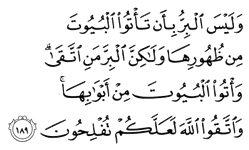Common Sense, Troublesome Things, Injustice
Issue 905 » July 29, 2016 - Shawwal 24, 1437
Living The Quran
Common Sense
Al-Baqara (The Cow) - Chapter 2: Verse 189 (partial)
 "It is not virtue if you enter your houses from the back. It is virtue if you fear Allah. Enter houses through proper doors and fear Allah so that you may prosper."
"It is not virtue if you enter your houses from the back. It is virtue if you fear Allah. Enter houses through proper doors and fear Allah so that you may prosper."
During the Jahiliyyah period it was customary among Arabs that until the completion of Hajj rites they did not enter their homes through doors. They did so thinking that until they finally returned from the House of Allah, they should not enter their houses in the normal way. Until the completion of Hajj they made their way into their houses through the roofs or walls. Worse, they regarded this as an act of great virtue. For them it amounted to paying tribute to the House of Allah. There was no divine directive to support this whimsical notion. The Quran dispels their misconception in the above verse.
The Quran upholds and recommends common sense on this account. This norm applies not only to the entrance to domiciles but also to all aspects of life. If one intends to learn the skills of a trade, one should do so in a proper manner. One is expected to learn the trade at the feet of a competent teacher, gain familiarity with the tools and advance one's knowledge step by step. Divine rules are based on human nature and common sense. If one does not follow the laws of nature, once cannot reach one's goal.
Compiled From:
"Guidance from the Quran" - Abul Hasan Ali Nadwi, pp. 232-234
Understanding The Prophet's Life
Troublesome Things
There are many Prophetic sayings about the cleanliness of roads. The Prophet, peace and blessings be upon him, tells in detail about the wideness of roads, the construction of roads, the maintenance of their cleanliness and protecting them against highwaymen.
In a hadith, God's Messenger says that a person who lifted a branch of tree from the road so that people were not disturbed and/or hurt went to Paradise because of this good deed (Muslim). In another hadith, he said: "All good and bad deeds of my Umma were shown to me. Among the good deeds was elimination of what is injurious from the thoroughfares. Among the bad deeds was the spittle on the ground that was not covered with earth" (Ibn Majah). In another hadith reported in Muslim, a man asked God's Messenger to teach him something so that he could derive benefit from it. The Prophet said: "Remove the troublesome thing from the paths of Muslims."
In the hadiths mentioned above, the word "troublesome thing" is frequently used. The Prophet did not say "stone," "thorn," "filth," etc., but he said "adha" or "troublesome thing," which comprises the meaning of all such things. This word is defined as small harm or defect in dictionaries. However, from the context it is used in Prophetic sayings we understand that it stands for anything that may annoy or harm those who pass on a road.
Compiled From:
"Cleanliness in Islam" - Remzi Kuscular
Blindspot!
Injustice
Humanity is our real common denominator. We share a proximity with all other human beings, and have a common set of inalienable rights as neighbours and kin in this world. This shared identity, our many shared interests, and basic ethics can provide us with a peaceful means to engage with each other when we differ.
People disagree with each other. This needs to be acknowledged. We should not shy away from our disagreements or try to gloss them over. The critical matter is to make sure we uphold the rights of those who disagree with us.
People do not have to share the same set of values and the societal identities to be just with one another. We must speak truthfully and act justly with everyone without exception. Injustice is always a sin. It is never allowed.
We need to make ourselves the keys to a better future and obstacles to misfortune. We should emulate the example of Prophet Muhammad when he arrived in Madinah, where Muslims lived along with pagans and Jews. Whenever there was tension, he acted to calm things down.
We should never think that conflict is the best way to reach our goals. When people give up on reason and the loudest, angriest voice wins the day, it is a crisis of major proportions.
Compiled From:
"Personal and Societal Crises" - Salman al-Oadah